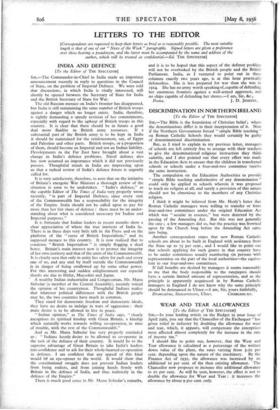LETTERS TO THE EDITOR
[Corresponcknts are requested to keep their letters as brief as is reasonably possible. The most suitable length is that of one of our "News of the Week" paragraPhs. Signed letters are given a preference over those bearing a pseudonym, and the latter must be accompanied by the name and address of the author, which will be treated as confidential.—Ed. THE SPECTATOR]
INDIA AND DEFENCE
[To the Editor of THE SPECTATOR]
SIR,—The Commander-in-Chief in India made an important announcement recently in reply to questions in the Council of State, on the problem of Imperial Defence. We were told that discussions, in which India is vitally interested, will shortly be opened between the Secretary of State for India and the British Secretary of State for War; The old Russian menace on India's frontier has disappeared, but India is still maintaining the same number of British troops against a danger which no longer exists. India, therefore, is rightly demanding a speedy revision of her commitments, especially with regard to the upkeep of British troops in this country. It is clear that there should be in future a good deal more fluidity in British army resources. If a substantial part of the British army is to be kept in India it should be maintained for the reinforcement, say, of Egypt and Palestine and other parts. British troops, or a proportion of them, should become an Imperial and not an Indian liability.
Developments in the Far East have brought about a vast change in India's defence problems. Naval defence also has now assumed an importance which it did not previously possess. Thoughtful minds in India are impressing upon us that a radical review of India's defence forces is urgently called for.
It is very satisfactory, therefore, to note that on the initiative of Britain's energetic War Minister a thorough review of the situation is soon to be undertaken. "India's defence," as
the capable Editor of The Times of India very properly wrote recently, "is part of Imperial Defence, since every unit
of the Commonwealth has a responsibility for the integrity of the Empire. India should not be called upon to pay for more than her fair share of defence : there must be an under- standing about what is considered necessary for Indian and Imperial purposes."
It is fortunate that Indian leaders in recent months show a clear appreciation of where the true interests of India lie.
There is in these days very little talk in the Press and on the platform of the "curse of British Imperialism," and its supposed menace to this country. It is now realised that to condemn "British Imperialism" is simply flogging a dead horse. Britain's main interest now is to protect the integrity of her own territory and that of the units of the Commonwealth.
It is clearly seen that only in unity lies safety for each and every one of us, and any unit by itself outside the Commonwealth is in danger of being swallowed up by some other power. For this interesting and sudden enlightenment our especial thanks are due to Hitler, Mussolini and Japan.
s A wealthy Indian industrialist and Congressman, Mr. Manu Subedar (a member of the Central Assembly), recently voiced
the opinion of his countrymen. Thoughtful Indians realise that whatever political differences with the British people may be, the two countries have much in common.
They stand for democratic freedom and democratic ideals, they have no desire to indulge in wars of aggression : their main desire is to be allowed to live in peace.
"Indian opinion," as The Times of India says, "clearly recognises its spiritual kinship with Great Britain, a kinship which naturally works towards willing co-operation, in time of trouble, with the rest of the Commonwealth."
And as Mr. Manu Subedar has very properly reminded us : "Indians keenly desire to be allowed to co-operate in the task of the defence of their country. It would be to the supreme advantage of Great Britain to take India's leaders into confidence and to ask for their whole-hearted co-operation in defence. I am confident that any appeal of this kind would be an eye-opener to the world. It would show that the constitutional struggle does not prevent Indian leaders from being realists, and from joining hands firmly with Britain in the defence of India, and thus indirectly in the defence of the Empire."
There is much good sense in Mr. Manu Subedar's_remarks,
and it is to be hoped that this aspect of the defence problem will not be overlooked by the British people and the British Parliament. India, as I ventured to point out in these columns exactly two years ago, is at this hour practically defenceless. She is less prepared for war than she was in 1914. She has no army worth speaking of, capable of defending her enormous frontiers against a well-armed aggressor, and no ships capable of defending her shores.—I am, Sir, &c.,


































































 Previous page
Previous page